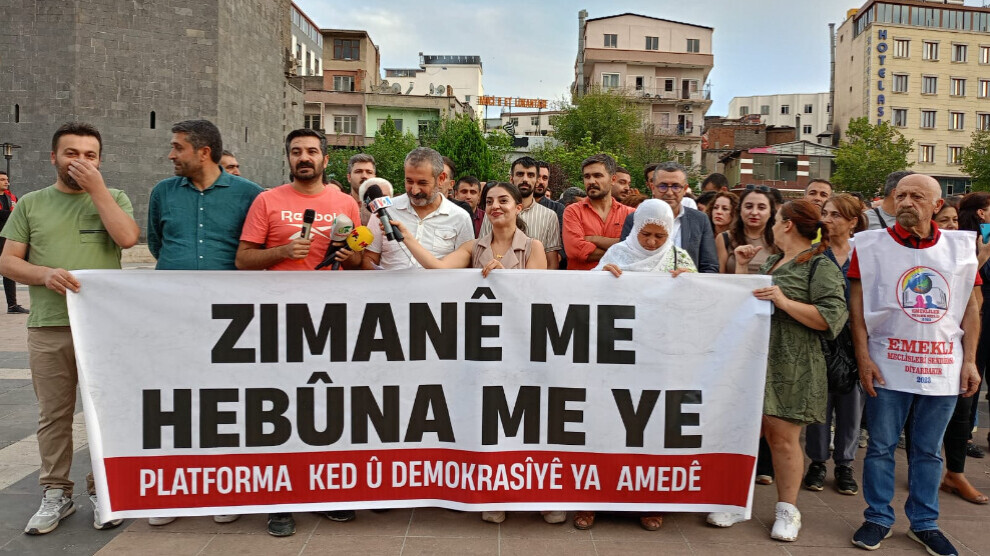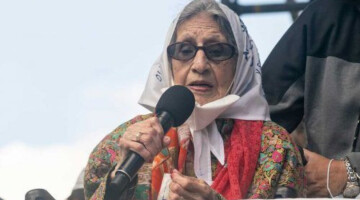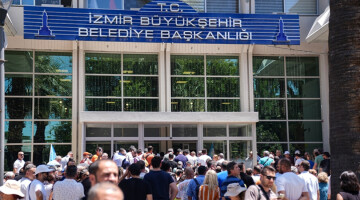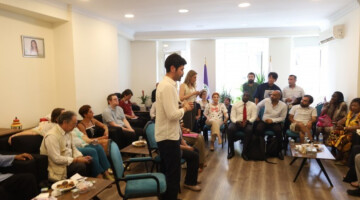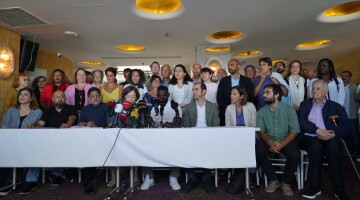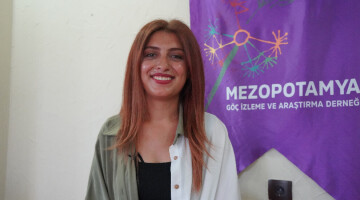Amed (Diyarbakır) Labour and Democracy Platform made a press statement at Şêx Seîd (Dağkapı) Square protesting the police raid on Mesopotamia Language and Culture Research Association (MED-DER), Payîz Pirtûk bookstore and Anka Language and Art Education Cooperative, which organises multilingual education and art workshops, and the detention of 23 people.
The demonstration was attended by civil society organisations, political party representatives, Peoples' Equality and Democracy Party (DEM Party) MP Serhat Eren and many people. A banner reading Zimanê me hebûna me ye” (Our language is our existence) was unfurled and slogans such as “Zimanê me rûmeta me ye” (Our language is our honour, “Bê Kurdî jiyan nabe” (No life without Kurdish) and “Bê ziman jiyan nabe” (No life without language) were chanted.
Faruk Ercan, Co-Chair of Education and Science Workers' Union (Eğitim-Sen) Amed Branch No. 1 and Amed Labour and Democracy Platform Term Spokesperson, made the statement on behalf of the platform. Ercan said that the AKP-MHP alliance's practices against Kurdish language and culture is a policy of ‘extermination’. Stating that this multilingual, multicultural geography has been turned into a ‘cultural graveyard’ due to 100 years of policies of denial and assimilation, Ercan said: “This is precisely the reason for the moral cultural crisis that is developing today. The Kurdish language and culture, with its historical depth and richness, has shown the greatest resurrection against these policies of denial and assimilation and today it still lives as a language used by nearly 50 million Kurds around the world. However, fascism has recently reached a point where it manifests itself with a policy of cultural destruction, especially against Kurdish culture.”
Faruk Ercan referred to the pressures on the Kurdish language and stated the following: “In western Turkey, workers and young people who speak Kurdish are subjected to lynch attempts; listening to Kurdish music and dancing to Kurdish music are prevented under judicial pressure as if it were a crime; warning signs prepared by local administrations in consideration of the mother tongue of the people are erased and prevented. Such practices do not benefit anyone, especially the government. Just as changing the names of villages and cities in Kurdistan and forbidding Kurds to give Kurdish names to their children did not benefit anyone, neither will these practices. On the contrary, it will further damage the state of peace and harmony between the peoples and make the society tense.”
Remarking that the right to education in Kurdish is denied, which constitutes the clearest expression of social inequality, and Kurdish is defined as an ‘unknown language’ in the Parliament, Ercan said: “In this situation, no one should talk about equal citizenship in Turkey. We can see the AKP-MHP government's efforts to subject the Kurdish people to genocide by destroying Kurdish culture and language. What is being practised is cultural fascism. Kurds have been struggling for their language and culture for decades. This struggle will never stop despite the policies of cultural genocide, which is a system of racist attacks.”
Pointing out that every society ensures its existence through its language and culture, Ercan said: “The right to language and culture is a moral and conscientious right for every society. Destroying and usurping this right eliminates the possibilities of democracy and peace. In order to ensure that not only the Kurdish people but also all the peoples of Turkey live in peace, democracy and prosperity, and to re-establish social peace, they should abandon their policies on Kurdish language and culture.”
Ercan called for the release of those detained and the removal of obstacles to their work.

